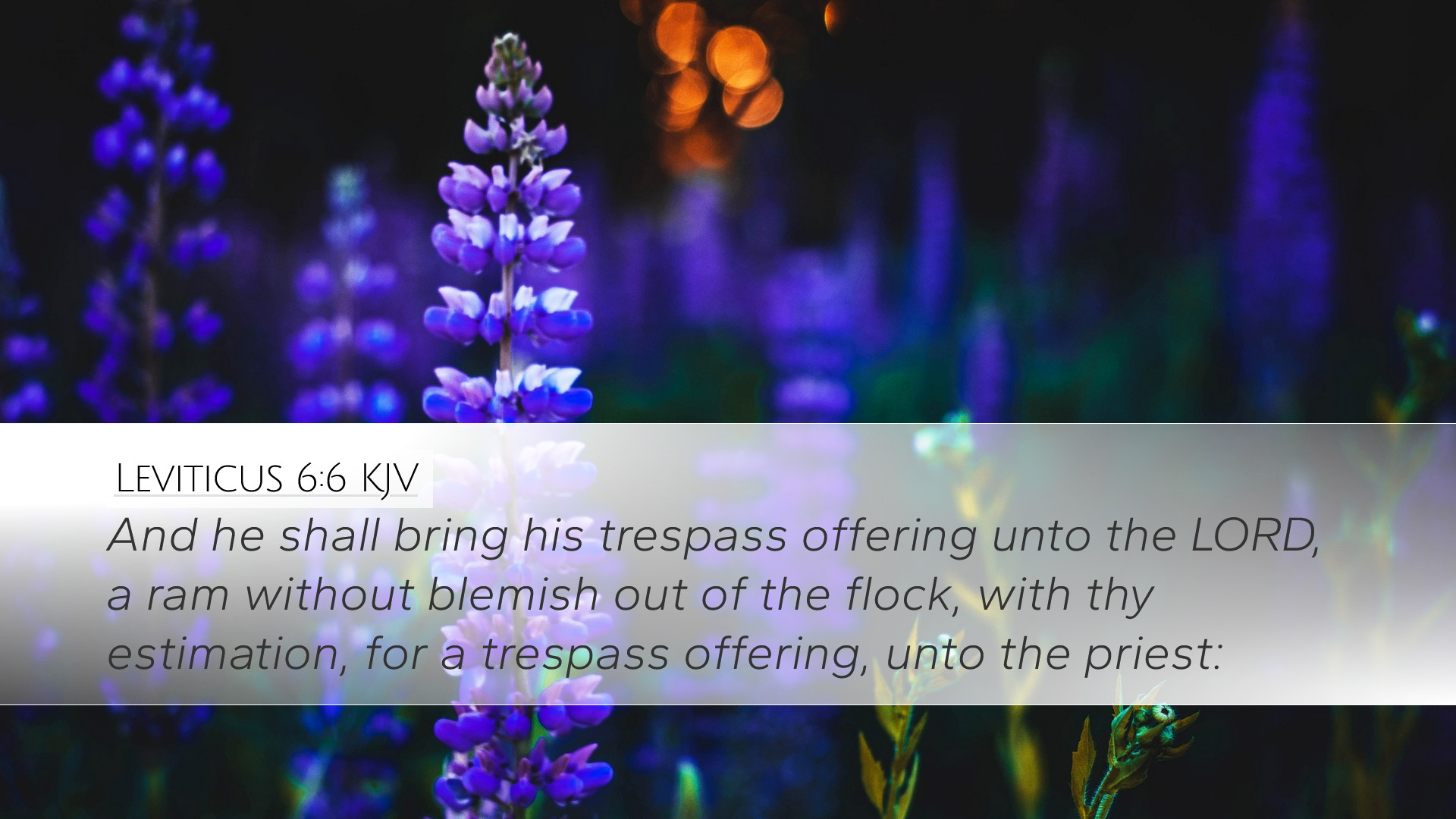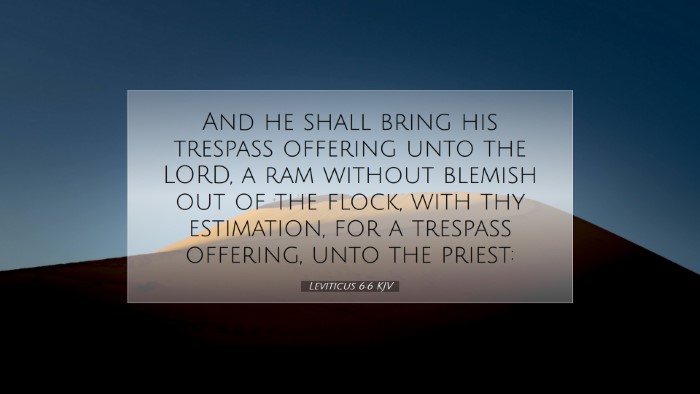Commentary on Leviticus 6:6
Bible Verse: "And he shall bring his trespass offering unto the LORD for his sin which he hath sinned: a female from the flock, a lamb or a kid of the goats, for a sin offering; and the priest shall make an atonement for him concerning his sin." (Leviticus 6:6)
Contextual Background
The Book of Leviticus is primarily a manual of holiness, detailing the laws and rituals that govern worship, sacrifices, and conduct among the Israelite community. This particular verse pertains to the regulations surrounding the offering brought to the Lord when an individual commits a trespass or a sin, highlighting the significance of atonement and the prescribed methods for reconciliation with God.
Exegesis of the Verse
In this verse, we find explicit instructions regarding the type of offering required when a person sins. The concept of sin in Leviticus encompasses both intentional and unintentional transgressions against God’s commands as well as wrongs committed against fellow individuals. The offerings serve as a means of restitution and convey the seriousness with which sin must be treated.
Significance of the Offerings
- Trespass Offering: This offering is particularly highlighted as a means of addressing offenses, emphasizing a personal responsibility to rectify wrongs.
- Choice of Animal: The requirement for a female from the flock indicates the level of seriousness and the need for a pure sacrifice, reflecting the character of God.
- Role of the Priest: The priest's involvement signifies the intermediary role in the relationship between the sinner and God, an essential aspect of the sacrificial system.
Theological Implications
This verse reveals several theological themes that are essential for understanding the nature of sin, atonement, and the character of God.
1. The Nature of Sin
Sin is presented not merely as a personal failing, but as a serious offense against God's holiness. The law establishes the need for acknowledgment and making amends with God through appropriate offerings.
2. Atonement and Sacrifice
The system of sacrifices underscores the idea that atonement requires a price. The specific requirement for a female lamb or goat points to the importance of presenting something of value to God as a sign of repentance.
3. God's Justice and Mercy
While God's justice demands punishment for sin, His mercy provides a means of reconciliation. The sacrificial system embodies both aspects—God desires to forgive yet maintains His righteous standards.
Insights from Public Domain Commentaries
Matthew Henry
Henry emphasizes that the requirement of an offering indicates the serious consequences of sin. He notes that the act of bringing a trespass offering symbolizes a genuine desire for reconciliation with God and showcases the repentant heart. Henry also points out that the choice of offerings should reflect the acknowledgment of the sin committed.
Albert Barnes
Barnes provides insight into the sacrificial system, illustrating the concept of substitution in the sacrificial offerings. He highlights that the sinner must bring an offering, which serves as a token of the urgency to seek restoration. Barnes discusses the role of the priest as a mediator, affirming that it is through the priest’s action that atonement is made for the sin.
Adam Clarke
Clarke focuses on the merits of the offerings and provides a rich commentary on the symbolism inherent in the animal sacrifices. He discusses how the specifications of the sacrificial animals foreshadow the ultimate sacrifice of Christ, drawing parallels between the Levitical system and New Testament theology. Clarke’s interpretation reinforces the notion that while the sacrifices were necessary for atonement, they were ultimately a precursor to the complete redemption provided through Jesus Christ.
Conclusion
Leviticus 6:6 is a powerful reminder of the weight of sin and the gracious provisions God has made for reconciliation. The verse invites deep reflection on the nature of our offenses against God and the importance of approaching Him with sincerity and repentance. For pastors, students, and theologians, this passage not only instructs on the ancient practices of worship but also illuminates the overarching narrative of redemption that culminates in Christ. By understanding these connections, one can appreciate the depth of God’s mercy and the seriousness with which He regards our relationship with Him.


